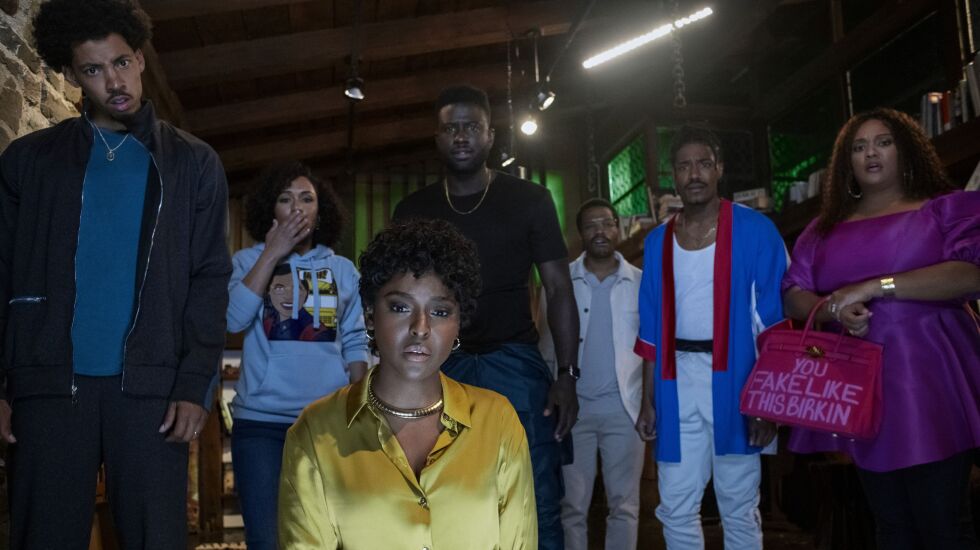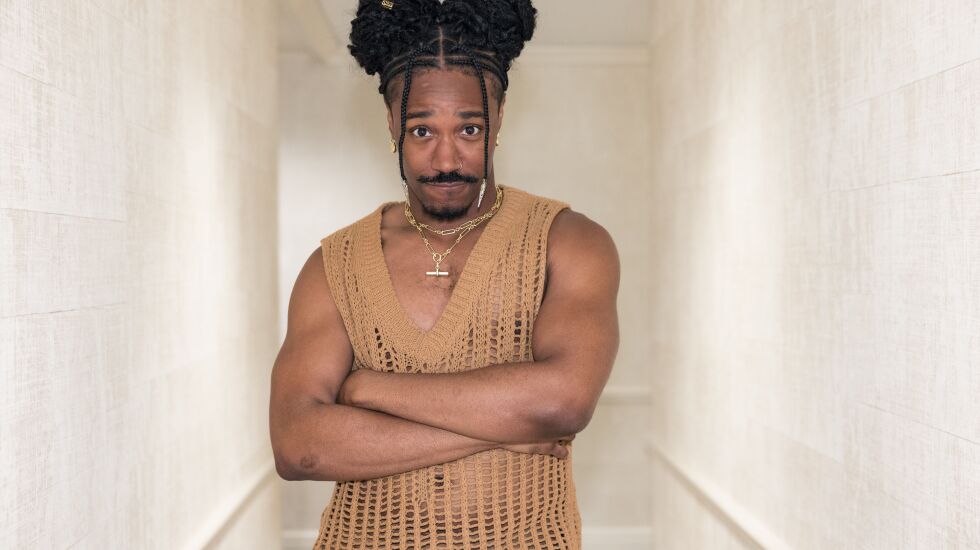
If the Black character is often the first to die in horror films, as they do in “The Shining,” “Scream 2,” “Day of the Dead” and countless others, who dies first when the entire cast is Black?
This question serves as the premise for the 2018 video comedy sketch “The Blackening,” in which a group of friends find themselves trapped in a cabin deep in the woods as a deranged killer circles the property, ready to pick them off one by one. Their only hope of survival is to comply with the killer’s demand: “He’ll spare the rest of us if we give him the person that’s … the Blackest.”
The line, spoken by the sketch’s author, Chicago native Dewayne Perkins, kicks off a survivalist one-upmanship among the group on who can out-Caucasian the other Black characters. Options include, “I’m so white, I let my dog kiss me on the mouth,” “I thought quinoa was one of the days of Kwanzaa,” and “I voted for Trump.”
The sketch went viral, quickly garnering hundreds of thousands of views and still racking up more to this day.
Perkins, a Black and queer Second City alum, expanded on the sketch and co-wrote a full-length version of “The Blackening,” out Wednesday. The film carries great industry prestige: It was co-written by Tracy Oliver (“Girls Trip”) and directed by Tim Story (“Barbershop,” “Ride Along,” “Fantastic Four”), and it premiered last fall at the Toronto International Film Festival.
In the new film, a group of friends rent a cabin in the woods for a Juneteenth celebration and reunion. Soon after, a killer locks them inside and demands they offer up a sacrificial lamb; when that fails to satiate the psycho, the group must set aside past drama and band together for survival. The cast includes Perkins, Grace Byers (“Empire”) and Jermaine Fowler (“Coming 2 America”).
“The Blackening” remains rooted in the cinematic trope and comedic conceit that inspired the original sketch, but expands it to generally comment on the minimized, tokenized role of Black characters in horror. It presents something traditionally rare in horror films: multidimensional Black characters and friendships.

“People ask how I started writing; it was necessary if I wanted to do the things that I wanted to do,” Perkins said during a Chicago visit Tuesday. “Waiting for scripts that felt representative was just not happening. I figured out pretty early that I had to create the thing that I wanted to see.”
Writing “The Blackening” afforded Perkins to present additional pieces of his own identity. “Oftentimes, [queer narratives] feel complementary to people — they’re never the main story,” he said. “Creating depth and giving character to the gay best friend to take away from any trope was very important to me. It spoke to my entire identity as a Black gay man.”
The short video version of “The Blackening” began as a live sketch written by Perkins for the comedy ensemble 3Peat. Formed in 2012, the all-Black group featured Chicago comic actors seeking inclusivity and onstage representation.
Patrick Rowland (“The Amber Ruffin Show”), one of the founders, recalls countless commercial auditions seeking a “Black male” during which he ran into contemporaries vying for the same opportunity. “It was almost like a family reunion,” he said. “[With 3Peat,] we created our own opportunities as opposed to being in the whole machine of, ‘We need one Black actor; you all fight to the death.’ ”
Other members of 3Peat included Chris Redd (“Saturday Night Live”), John Thibodeaux (“The Late Show With Stephen Colbert”) and Lisa Beasley (“South Side”).
Perkins, who grew up in the Chicago Lawn neighborhood near Marquette Park, joined the group in 2016. He was working as an intern at the North Side’s iO Theater, where 3Peat was performing a weekly improv show. Nnamdi Ngwe, one of 3Peat’s founders, knew Perkins and invited him to improvise with the group one night; he fit right in.
For 3Peat’s performance in the 2016 comedy variety show “Afro-Futurism” at Second City, Perkins wrote “The Blackening” as a sketch and it was a hit. Later that year, Second City partnered with Woolly Mammoth Theatre Company in Washington, D.C., for a run of the sketch show “Black Side of the Moon” at the company’s space there.
Perkins, a cast member, brought the sketch, and it caught the eye of Comedy Central, which signed 3Peat to a deal for a few videos. “The Blackening” was the first, and its viral response caught the attention of Oliver and Story, who sought out Perkins for a full-length adaptation.
Story, who originally came on as a producer, read the first draft of the script and quickly offered to direct. “There are times in your career when you read something that just makes sense, and I didn’t want to hesitate in terms of going for it,” he said. “[Perkins] is a true talent. He has a voice that is just very refreshing.”
Perkins — who has written on “Brooklyn Nine-Nine,” “The Amber Ruffin Show” (hosted by fellow SC alum Ruffin) and “The Break With Michelle Wolf” — sharpened that voice in Chicago as an ensemble player, solo sketch artist and stand-up comic. He served as an understudy to Second City’s National Touring Company, which he credits with helping develop the ability to translate his distinct background and experiences to audiences who may not share his point of view.
“I don’t want to create something that feels so unique that people can’t relate to it, but I’m also not going to change what I want for the audience,” he said. “The skills I learned and honed through that building … only made it easier to write this film.”

Perkins’ art speaks to injustices onstage and onscreen, and his offstage words hold comparable power.
In June 2020, when Second City posted support for the Black Lives Matter movement on Twitter, Perkins, who left the theater in 2017, replied with a thread outlining the inequitable treatment he received while performing with the company. Examples he cited include not scolding white directors for using the N-word and sending Black actors to speech therapy.
A day after Perkins posted, Second City CEO and Executive Producer Andrew Alexander abruptly stepped down and promised to sell his share in the company, which he did the next year.
“The Second City cannot begin to call itself anti-racist,” Alexander wrote in an open letter at the time. “That is one of the great failures of my life.” His letter included tangible steps the theater would be taking to improve diversity, equity and inclusion both onstage and off.
Perkins said his tweets were intended to share and highlight his own experiences and weren’t necessarily meant to spark change, adding he was equally surprised and not surprised by the swift action taken by Second City.
His work, however, is more vocal: “The Blackening” celebrates Black and queer narratives while exposing that the industry has a long way to go in terms of representation.
“I’ve watched so many things that are not made for me, that I was not thought about when created,” Perkins said. “Being able to move in with that same unapologetic energy was essential to creating this film, and I think that’s why it feels new and refreshing. … I’m very happy that we’re able to create a film that feels very, unapologetically us.”







